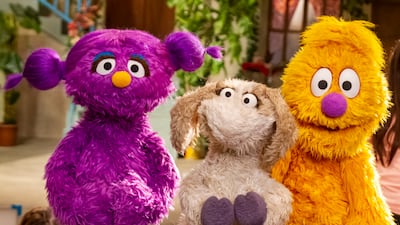The Arabic version of Sesame Street wants children to feel good about themselves.
Returning for its seventh season and broadcast daily on MBC, Ahlan Simsim has a more polished look and episodes revolve around themes of self-confidence and emotional intelligence.
The series is part of a broader humanitarian initiative of the same name ― a partnership between Sesame Workshop and the International Rescue Committee.
As part of the agreement, exclusive educational content will be created as part of the organisation's services in Iraq, Jordan, Lebanon and Syria.
Such a vast scope, however, runs the risk of the show, which is shot in Jordan, losing the focus responsible for its success.
"One thing we are trying to make sure is that it has to be funny,” says executive producer Khaled Haddad.
“Sesame Street has been doing this for over 50 years and they do have a model of achieving an educational goal through a funny story.”
A scan through the videos on the programme's YouTube channel illustrates the approach.
In one animated entry, the muppet Basma learns to deal with the disappointment of breaking her toy through the support of her friends.
In another episode Basma is anxious after losing a ball that belongs to her goat friend Ma’zooza. The 10-minute segment, mixing real-life puppetry with animation and music, deftly weaves in the show's emotive themes with Basma being asked, "Are you OK?" as she is encouraged to express herself.
Finding that sweet spot between humour and the heartfelt wasn’t straightforward, says Scott Cameron, head of production at Sesame Workshop.
While the organisation launched numerous international co-productions of the show — such as India's Galli Galli Sim Sim, Japan's Sesami Sutorito and Sesamo First Show in Brazil — Cameron says the latest season of Ahlan Simsim is by far the most ambitious of the bunch.
"We have never produced at this scale and with a partner like the International Rescue Committee," he tells The National
"As part of that mandate we focus on creating specific content for four target countries, while at the same time making the show appeal to a pan-Arab audience through our lead broadcaster MBC, which is shown in 22 countries in the region.”

To create content that resonates with such a diverse audience requires a collaborative effort.
While Sesame Workshop provides institutional knowledge regarding the show’s visual and narrative style, the International Rescue Committee provided guidance on the kind of characters tailored for the region.
"We also have researchers and education consultants from the Arab region out in the field talking to parents and educators," Haddad says.
"They give us continuous feedback when it comes to the educational and psychological aspects of the stories.”
One of the insights from Sesame Workshop’s internal research is the growing appeal of animation.
"Kids around the world love animation and that was immediately apparent when we started developing Ahlan Simsin, because the classic cartoon Tom and Jerry is still popular in the region," Cameron says.
"So we decided to bring more animation into the show because it does make kids laugh and lean in to watch."
Animation also makes for good comedy.
Among the most popular characters on Ahlan Simsim are a troupe of insect dabke dancers, whose routines often descend into slapstick comedy.
"They pop into the screen and sometimes interact with the puppets in a silly and physically comedic way,” Cameron says.
“This always helps the humour because with children it doesn't always have to be verbal.”
While the show’s cast have visited Petra via green screen technology, Cameron says Ahlan Simsim is at its best when it shoots on location.
"We shoot short films where we interview kids so they can also see themselves on screen," he says.
"But there is something magical about seeing the muppets outside in a real place and how the sunlight falls on their fur. It really is a 'wow' moment.”

While pleased that Ahlan Simsim has become a go-to edutainment choice for Arab families, Haddad is concerned at the lack of children’s content being produced in the region.
"It's sad to say that other than us there are not many Arabic shows for children. Ahlan Simsim is the only Arabic children's show to premiere in Ramadan," he says.
"So it tells me that all other producers want to tell different kinds of stories rather than also appeal to children. This is an unfortunate situation but I am proud that we have a show, produced in the region by Arabs for Arab children.”
Ahlan Simsim is broadcast daily on MBC 3 at 2.30pm UAE time.


